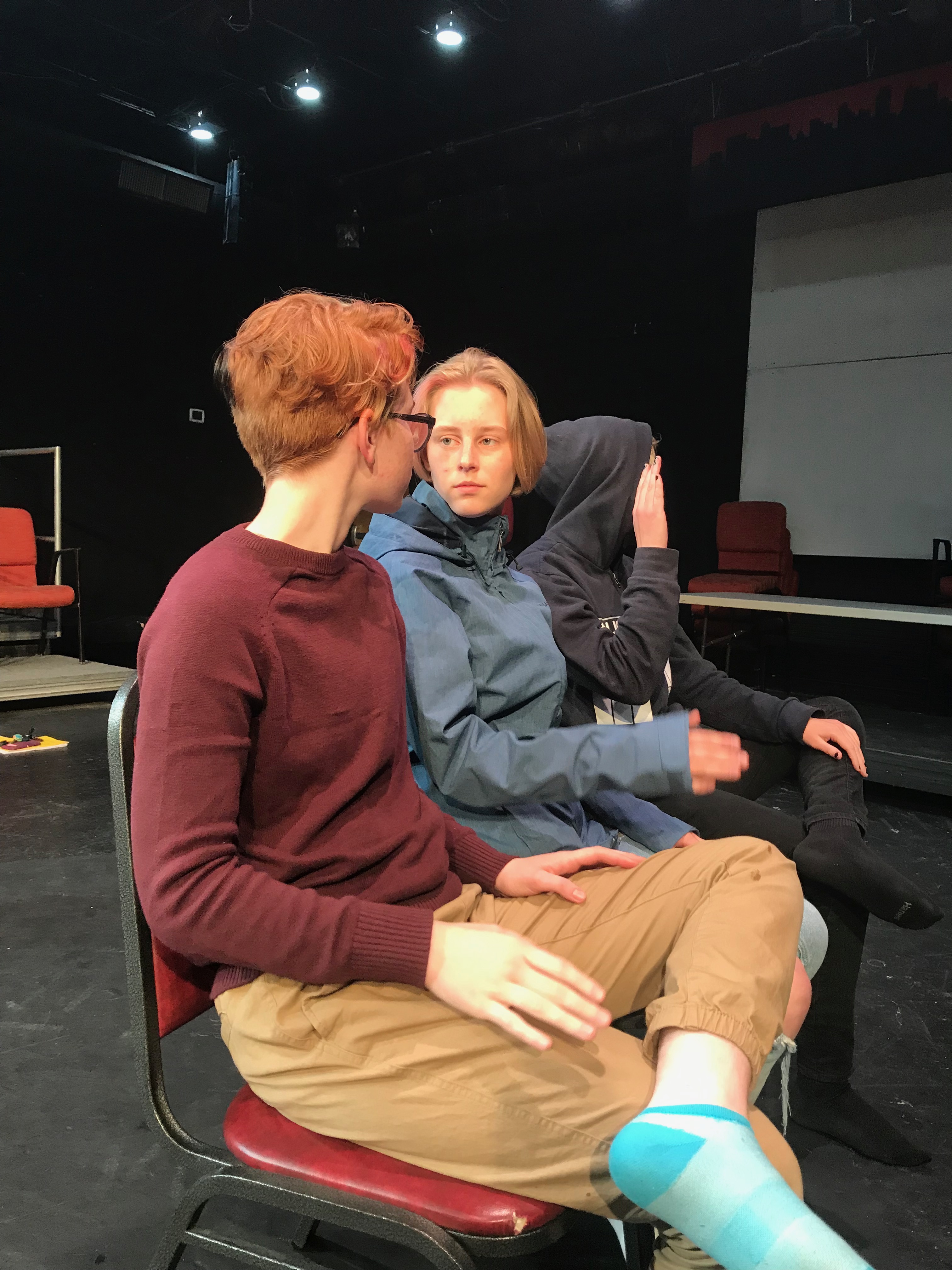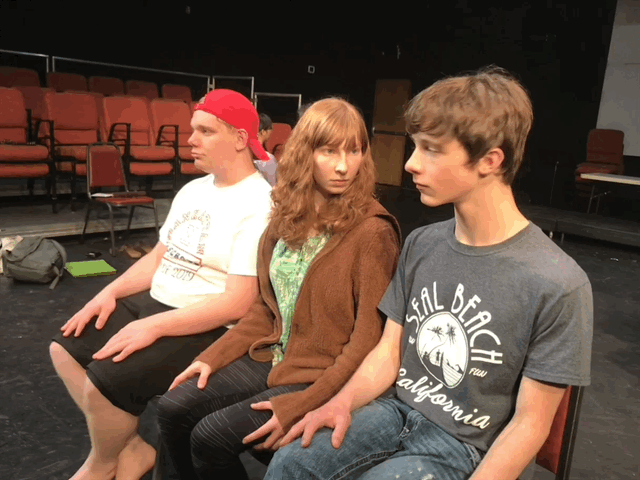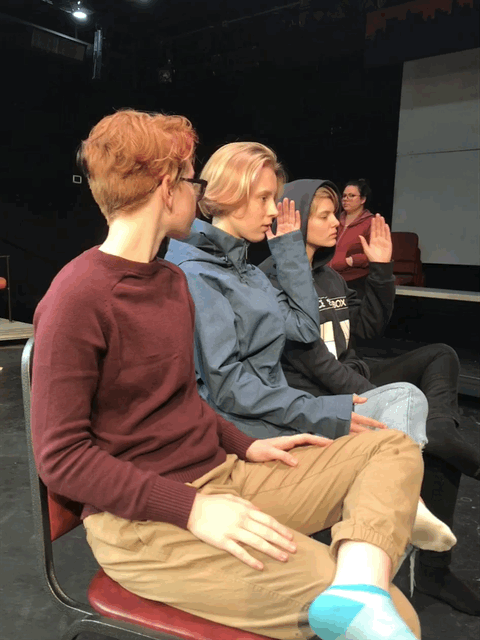“We don’t whine enough.”
Megan made this hilarious statement during warm-ups as she instructed us to whine while pretending to suck on a sour lemon drop. But honestly, she’s right! Not just about whining, but about all the things we deny ourselves on a daily basis: yelling, wailing, spinning, tumbling, etc. As humans, we have a rich and full range of movements and sounds, but we only use a very small amount of them. Why? Because society confines us to act a certain (and, in my opinion, less fun) way. Sure, it’s probably beneficial to act what is deemed “appropriate” in certain situations, but Megan’s comment reminded me of all the qualities that make us human that we willingly set aside to fit in. Good thing MXTW is the perfect place to stand out and explore all of our abilities!
After warm-ups, we played another game of Red Ball. There were a couple of groans as we began, but it became clear pretty quickly that we were up for the task! The participants’ confidence seemed to have grown ten-fold since the last session, and after a reminder from Gwethalyn, we let the tension in our bodies go. Relaxed is the best way to play Red Ball, and it showed! Next, we revisited shaping by shaping in relation to a partner–one actor would begin in a shape and the other would make a shape in response. The participants became pioneers of positive and negative space as they shaped with each other and the whole room. Some chose to leave their distance to only the microscopic space caused by the forces of gravity repelling their partner’s atoms. Others ventured across the sea of negative space to shape with their partner from the opposite side of the room.
Next, we transitioned to Mover/Sounder. Starting in partners and then eventually playing as a whole ensemble, some actors would make sounds, and the others would move in response to those sounds. A cacophony of otherworldly screeches and bellows erupted, and the actors shriveled, writhed, and shook in dialogue. Lauren, commenting on the noise, said: “They sound like the gibbons at the zoo!” Then the sounders were given qualities to try for their vocalizations–aggressive, comforting, uncomfortable, painful, and (Megan’s idea) “emergency.” When the sounders changed, the movers changed with them, creating a dynamic shift with each new idea. Just as in partner shaping, the actors had to let the work of others affect them. Observe it. Take it in. And then respond. Dealing with influence is a large part of the workshop, as we will eventually choose playwrights to influence our work. But another influence we will work from is each other. By using the shapes or sounds we create, we can devise something completely new and exciting all from our own heads. We finished this exploration of influence by having a solo sounder make phrases of sound interspersed with silence. The rest of the participants started in a group shape. Then they moved as one to the sounds and stood still together in the silences. It was the ultimate test, as they had to respond to not only the sounds but to what everyone else was doing too. What resulted was an undulating mass that expanded and contracted in response to shouts, wails, and yips. It reminded me of a pulsating brain, and maybe that’s exactly what it was as they gave into the group mind.
Then the tornado sirens went off. Typical Kansas! We headed back to the green room to take cover, but there was no way we were going to let a storm impede our work. Displaced among the couches and make-up mirrors, we started to learn about our first author of the day, Artaud. Having suffered from both physical and mental ailments, Artaud’s philosophy of theater would become defined as “Theater of Cruelty.” One participant’s response to this term was a sarcastic, “Greeaaat…” However, Artaud didn’t necessarily believe in being cruel to his audiences but instead communicating to them through the everyday cruelties of life. In his influential text, The Theater and its Double, he said:
“Theater must be louder than the fundamental pain of existence.”
And with his use of images of violence and pain, representation of sensations, nightmarish landscapes, and disturbing sounds, Artaud’s work is definitely loud. We started by reading Description of a Physical State choral style. The extremity of images causes quite a strain on the listener, and I felt like squirming in my seat. Certainly, the painful and exhausting description Artaud gives is inescapable and shouts down whatever is in the audience’s mind. “Horrifying,” said a participant once we were finished, “There is no way to distract from the images he creates.” Additionally, we also read Artaud’s There Is No More Firmament, in which a crowd of people reacts to a cataclysmic scene of the heavens falling to the earth. In her instructions, Megan created a group of sounders who created howling winds and sounds of constant pain. Meanwhile, the readers were meant to shout over the apocalyptic noises. The experience was smothering as the readers attempted to keep the chaos out. It seemed like an eery parallel to our own situation, sequestered from the storm. Also in the script were jarring breaks of silence where the sounds would suddenly stop, leaving me with gooses bumps. Altogether, Artaud’s style leaves the audience overwhelmed, and as one participant put it, “I felt like my organs were being jumbled around.”
Our other author was Harold Pinter. Before becoming a playwright, Pinter spent many years as an actor in Agatha Christie dramas and parlor comedies, and so he grew disdainful of “those plays.” We read two of his works: Applicant and, what has been deemed his most difficult and mysterious play, Silence. The former play is a part of Pinter’s comedies of menace, which is clear as it details a job interview taken to the absurd extreme. We laughed along to its hilarious absurdity, and the participants were quick to point on Pinter’s use of power dynamic. Meanwhile, the latter play belongs to Pinter’s memory plays, in which he claimed there was “no menace.” However, we were skeptical. In the play, it appears that the three characters shared some past trauma, but the memory of it has been destroyed, leaving the rest of the play to be, as Gwethalyn put it, “flotsam that has washed ashore.” Although this may not be true at all, as Pinter wrote his plays to be ambiguous and believed it was the audience’s job to make it clear. Regardless, as described by a participant, the whole play feels like “a memory you are struggling to remember.” It’s circular, and the characters often go back to the same events and rephrase and reimagine them. There is a creeping sense of tension, and it reminded me of Artaud’s There Is No More Firmament, in that just as the citizens try to keep out the unstoppable apocalypse, so do the characters of Pinter’s work as they try to subdue a buried trauma. If the actors eventually choose to write under Pinter’s influence, they will be careful to include his use of dialogue crafted to reveal the truth, minimal blocking, repetition, non-linear use of time, unreliable speakers, and his uniques use of silence–“the Pinter pause”–in which the character cannot escape the truth.
By the time we finished our reading, the tornado warning had ended, and so we moved back into the performance space for one last exercise. We grouped the participants into threes and had them sit in chairs in a line. Then they were told they could only do three things: turn their head, raise their hand, or cross their legs. Then it was time to explore. Again, the actors had to let the actions of their group influence what they were doing. When watching them, it struck us how each group seemed to have a different storyline, but we had to remind ourselves that there was no story at all, but just a set of movements. It’s so typical as humans to try and make a story out of nonsense, and it is precisely that attribute that many of the playwrights we study try to subvert or frustrate. As we continue to explore, it will benefit us to remember that.
















Leave a Reply
You must be logged in to post a comment.